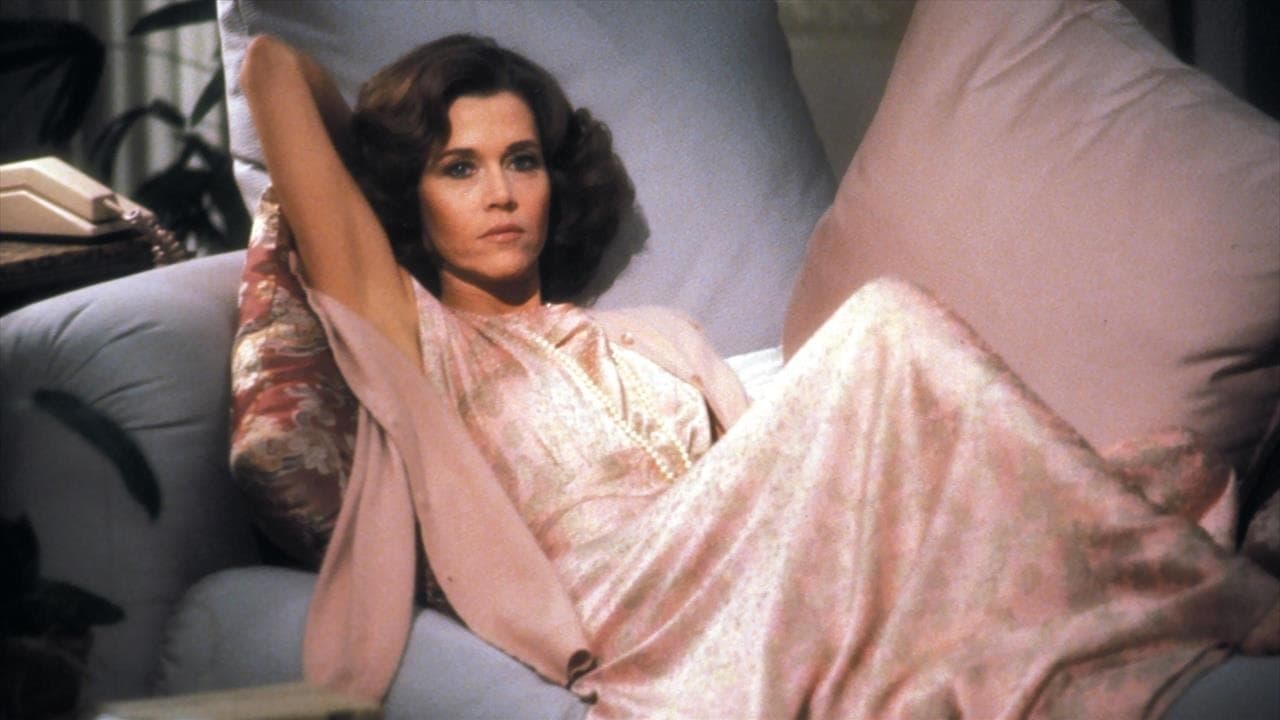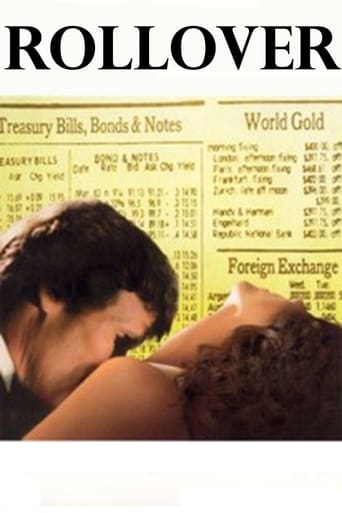

Just perfect...
... View MoreGreat Film overall
... View MoreI enjoyed watching this film and would recommend other to give it a try , (as I am) but this movie, although enjoyable to watch due to the better than average acting fails to add anything new to its storyline that is all too familiar to these types of movies.
... View MoreBlistering performances.
... View MoreWOW! This is a case of a film that needs to be resurrected among publics right now because it's final message resonates truer than anything with the whole current financial world going to the drains. The script was saying some hard truths back in 1981, no one listened and in 2008, almost three decades later something happened almost exactly the same way Hume Cronyn's character described it was going to happen: riots, stagnation, panic. Well, not much like the one of 1929 but a little closer to that. The context in which "Rollover" was presented was completely different however, Cold War was in it full course and Socialism was still surviving and fighting against the powers of Capitalism. The economical crisis that will happen in this film comes from an Arab oil organization (allied with some American bankers) who has a gigantic masterplan that is going to bring chaos in the world economy.But until we get there, we follow the story of a former actress (Jane Fonda) who married the Chairman and primary stockholder of a chemical company, recently murdered, that not only investigates his strange murder but also tries to deal with his business by joining forces with a financier (Kris Kristofferson) who recently was appointed as new president of a large bank that seems to going under a lot of trouble. While their relationship goes from the economic level to more intimate levels, a huge operation is being made with their investments that could cause a financial collapse."Rollover" looks at too many directions but doesn't see enough, it doesn't have a complete view on anything as a film. It goes as a financial thriller, a political thriller with some cheesy romance and as a drama. Problem is that there's far too many things to make anyone uninterested of seeing this when it could be something remarkably brilliant if the writers or director Alan J. Pakula decided for just one route to follow through. While the affair between Fonda and Kristofferson has its good moments when it's not becoming distractive, the thrilling parts of this are so few and the economics jargon are so many that the ultimate thing for this is a film hard to follow.But it gets worse before it gets better as some say. The greatest surprise is reserved for its final minutes with the inevitable crisis going ahead. I don't know if back in '81 something like this could happen but now, we know, it can happen and it did! It's realistic and shocking how this film managed (in a way, not completely though) to see how our world would become with all this lousy speculations. 30 years later and the impact of its crash is hitting us just now. Well made, nicely presented and well acted, with some weak moments here and there but very good to watch. Extremely relevant! 7/10
... View MoreAlan J. Pakula directs "Rollover", a conspiracy thriller which anticipates Oliver Stone's "Wall Street" and subsequent real life financial crises. The plot: Maxwell Emery, Wall Street guru and chairman of First New York Bank, bails out the struggling Boro National Bank. He then installs Hub Smith (Kris Kristofferson), a "fixer" tasked with getting Boro back up and running. Hub studies Boro's figures and comes up with a plan to keep them solvent: broker a huge loan between a private investor and another business and use the broker's fee to keep Boro afloat for a couple more months. The business he sets his sights on is Winterchem, a company reeling from the recent murder of its chairman and founder, Charlie Winters. This murder has resulted in an internal struggle between Winterchem's current board and the newly widowed Lee Winters (Jane Fonda), who takes over the chairmanship of Winterchem and sets about acquiring the cash needed to buy a petrochemical plant in Spain. Hub helps Lee broker a deal with a group of Arabian money-men, but shortly afterwards discovers a mysterious bank account number which has begun showing up on various ledgers. Hub and Lee then uncover a conspiracy in which Arab money is trickled into a mysterious account and used to hedge against the engendered possibility of the dollar suffering quick drops in value. In a sense, the mystery account causes the dollar to drop and then profits off this drop. And as the account facilitates the slow removal of Arab deposits out of the American banking system, revealing the scam is an impossibility as this will result in economic and consumer confidence plummeting, causing a systemic collapse. As it's about macroeconomics, "Rollover" is a rather unique film. Pakula paints a world in which value is created out of nothingness, speculation and market manipulation run rampant, and covered-up murders are routinely committed by faceless corporations. This a fragile, irrational and arbitrary economy, forever capable of collapsing at any moment. Inject too much panic, too much hysteria, and the dominoes begin to fall, shareholders pulling out their wealth, companies imploding and local economies with them. Today, money movers and banking cartels have the power to decimate nations. These same men, while making decisions that affect civilizations, are themselves wholly cut off or insulated from the rest of society.So the film's title serves as a kind of unintentional quadruple allusion: money rolled over from one account to the next, a global market capable of being steam rolled at any moment, and a caste of men who roll over populaces who themselves roll over and take this abuse. Such a financial system is worse than unsustainable, its wholly precarious, the slightest inkling of eroded confidence capable of bringing things down. Indeed, today often all that separates a "good economy" from a "bad one" is the faith one has in the country's debt being repayable. And as our system's debt can never be paid back and always balloons, what bolsters a "good economy" is nothing but hope, faith, delusion and psychotic belief.Capitalism is itself a religion with its own doctrines, beliefs, pundits, bishops, clergy and papal circle. It believes that Economics is a law abiding, quantifiable science, when today it's more akin to crystal ball gazing and gambling. Of course current beliefs – the economic philosophy that pure, open markets are entirely rational, all knowing, and as good as supernatural entities that cannot do wrong and will always rectify themselves to self-preserve rather than fail – and their impending shatterings are akin to the hubris-shattering post-enlightenment and postmodern trends which rocketed across the fields of science, philosophy, history and art. You might even say that the observer effect (of quantum physics) itself affects economics: watching the system continuously impacts the system. But still faith persists that the system acts rationally.So at its best, "Rollover" highlights how strongly stock markets run on rumour, guesswork, manipulation, irrationality, gambling, hysteria, misinformation, disinformation, inside information, testosterone, mistakes and herd instinct. Today, the kind of trading seen in "Rollover" can be done by anyone with a credit card and modem. Consider something called ETFs (Exchange Traded Funds). They are basically mutual fund like entities that trade on the stock market, making them more liquid and more accessible to investors than mutual funds. For a while ETFs were the tickets to riches, and as the stock market crashed they erupted in value, making many instantly rich. But these ETFs are all designed such that they decay over time. Like crack cocaine these vehicles promise fast and stunning highs, but are doomed to collapse, each successive hit providing ever diminishing returns, lower lows that the addict believes can be escaped via yet more hits. Aesthetically the film is typical of Pakula: quiet, solemn, filled with much paranoia and invisible menace. For Pakula, like Kubrick, power is unseen, omnipresent, conspiratorial and capable of silencing anyone. He does his best to invest architecture and spaces with a kind of silent horror. Money moves fast, but the film is eerily tranquil. Much of the film revolves around a dull love affair between Fonda and Kristofferson. He's the archetypal cowboy, she's the wealthy princess/actress, Pakula intending them to be a satirical comment on American optimism, endurance and faith in heroic archetypes and upward mobility. Some of their dialogue neatly blurs the lines between modern finance lingo and the Old West ("You're gonna need a partner", much talk of "riding", "white horses" and "spirits of the West"), but Pakula can't handle satire. The film ends with our entire finance system collapsing and global turmoil racing across the planet. As a President's optimistic quote is read on a television, Fonda and Kirstofferson, now business partners, themselves adopt a stance of optimism. It's a happy ending which masks delusion and much madness; no lessons have been learnt. See "Demonlover", which further links such personal and institutional neuroses.7.9/10 – Worth one viewing.
... View MoreThis one could surely be considered one of Pakula's "paranoia" films but there are only 3 that are noteworthy. The reason for this is that this one is not in the same league as his Paranoia Trilogy.This one suffers from slow pacing, miscasting and just not enough of the intrigue/thriller aspect. Don't get me wrong, this film is worth it's 2 hours but you won't be gripped like you would be if you watched Klute or Parralax View etc.What saves this film is the ending. You'll notice how what happened at the ending of this looks pretty similar to what happened in late 2008 to the world economy. Be prepared to be spooked by the similarities almost 28 years after the fact.
... View MoreAn over valued dollar, the system on the brink, the big bankers and their government stooges have gone too far. Sound familiar? The previous poster attributes the financial melt down in the movie to capitalism. Actually, the movie doesn't touched at all on the causes of the system breakdown. But it is not capitalism, but government interference in the market which would cause such a melt down. But it is fun to see central banking get its just reward, and to see gold emerge a winner.
... View More